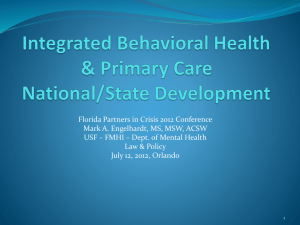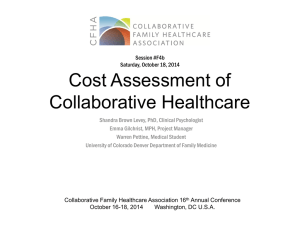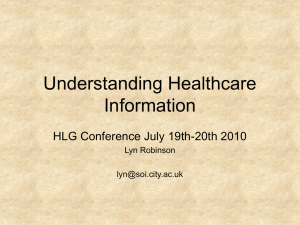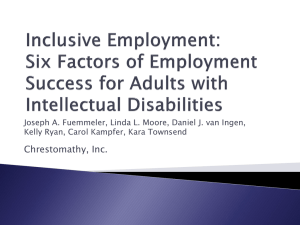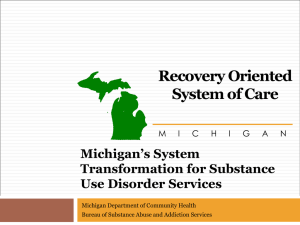Building a Recovery-Oriented System of Care
advertisement
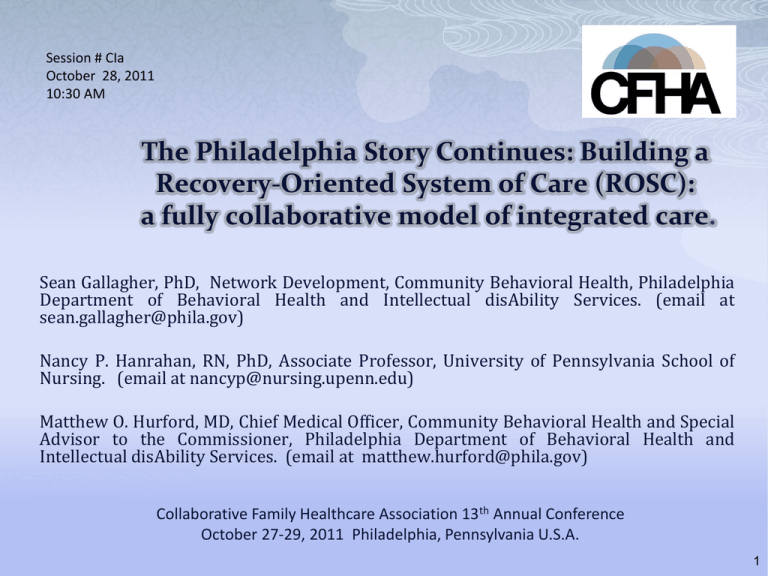
Session # CIa October 28, 2011 10:30 AM The Philadelphia Story Continues: Building a Recovery-Oriented System of Care (ROSC): a fully collaborative model of integrated care. Sean Gallagher, PhD, Network Development, Community Behavioral Health, Philadelphia Department of Behavioral Health and Intellectual disAbility Services. (email at sean.gallagher@phila.gov) Nancy P. Hanrahan, RN, PhD, Associate Professor, University of Pennsylvania School of Nursing. (email at nancyp@nursing.upenn.edu) Matthew O. Hurford, MD, Chief Medical Officer, Community Behavioral Health and Special Advisor to the Commissioner, Philadelphia Department of Behavioral Health and Intellectual disAbility Services. (email at matthew.hurford@phila.gov) Collaborative Family Healthcare Association 13th Annual Conference October 27-29, 2011 Philadelphia, Pennsylvania U.S.A. 1 Faculty Disclosure We have not had any relevant financial relationships during the past 12 months. 2 Learning Assessment As part of the Panel Presentation, the presenters have reserved 15 minutes in a Question and Answer section to maximize the learning opportunity through greater interaction, clarifications and exchange of ideas. Please hold all questions until the Q and A section. 3 Learning Objectives List the core values of a Recovery-Oriented System of Care Describe the relationship between collaborative care and recovery-oriented care Describe a Person-Directed approach to treatment Identify Tools for System Transformation 4 Expected Outcomes Increased understanding of integrated healthcare practice using and expanded view of collaborative care Increased knowledge about the transformation of large behavioral healthcare system towards a RecoveryOriented System of Care (ROSC) Review of research project in an acute care setting that is reflective of a ROSC. 5 Practice Gap & Supporting Resources Philadelphia has been engaged in a System Transformation process since 2005 that focuses on developing a RecoveryOriented System of Care (ROSC) This transformation has impacted every aspect of system operations; including treatment provision, policy development, stakeholder training, business practice, and funding strategies. A detailed documentation of this process can be found on our website at www.dbhids.org. where an extensive section on the Tools for Transformation is available for review and download. 6 Collaborative Care Sean Gallagher Ph.D. Network Development Community Behavioral Health Department of Behavioral Health and disAbility Services 7 Philadelphia History of Recovery 1776 - Declaration of Independence written and signed in Philadelphia. This document upheld that all Americans have the “the right to life, liberty and pursuit of happiness”. 1792 – Dr. Benjamin Rush, the “Father of American Psychiatry” built a wing in America’s first hospital to “provide humane care to persons suffering with mental illness”. 1817 – Friends Hospital was the first private mental hospital in the United States, developed by the Quakers “to facilitate the recovery of agitated minds” 8 Integrated Healthcare - 2010 CFHA’s 2010 Conference on Remaking National Healthcare examined integrated healthcare in various ways, presenters offered innovative ways to increase the level of collaboration with other healthcare professionals in a effort to improve healthcare delivery. Philadelphia’s Health Federation and the Department of Behavioral Health presented a five year pilot project to develop an integrated treatment model in several urban Federally Qualified Health Centers. The outcome is a promising integrated healthcare team approach that includes a behavioral health consultant as a full member of the team who provides timely/targeted strategies offering BH resources/supports in real time. 9 Collaborative Healthcare - 2011 In reviewing, the 2010 CFHA conference on collaborative and integrated care, a key element was often absent. In Philadelphia, this key element has become a focal point. This key element, once included, dramatically changes the dynamic of collaborative care as it is typically constructed. Integrated healthcare cannot be truly collaborative until the recipient of the healthcare service becomes a fully recognized and active partner in the planning and delivery of services. In Philadelphia, providing person-directed care is the main reason for developing a Recovery–Oriented System which can then achieve a fully collaborative model. 10 Recovery Transformation Matthew O. Hurford, MD, Chief Medical Officer Community Behavioral Health Special Advisor to the Commissioner Philadelphia Department of Behavioral Health and Intellectual disAbility Services 11 Transformation towards a Recovery-Oriented System of Care (ROSC) Aligning Concepts: Changing how we think Aligning Practice: Changing how we use language and practice at all levels; implementing values based change Aligning Context: Changing regulatory environment, policies and procedures, community support 12 Ten core values that have guided the development of transformation principles and strategies, and will continue to guide the implementation process; Four service domains in which the strategies will be carried out; and Seven system goals: concrete, action-oriented goals that organize and focus the strategies. 13 Strength-based Approaches that Promote Hope Community Inclusion, Partnership and Collaboration Person and Family-directed Approaches Family Inclusion and Leadership Peer Culture, Support and Leadership Person-First (Culturally Competent) Approaches Trauma-informed Approaches Holistic Approaches Toward Care Care for the Needs and Safety of Children and Adolescents Partnership and Transparency 14 Assertive Outreach & Initial Engagement Clinical Services: Screening, Assessment, Service Planning & Delivery Continuing Support & Early Re-intervention Community Connection & Mobilization 15 Seven System Goals Integrate Behavioral Health, Primary Care and Recovery Support Services Create an Atmosphere that Promotes Strength, Resilience and Recovery Develop Inclusive, Collaborative Service Teams and Processes Provide Services, Training and Supervision that Support Recovery and Resilience Provide Individualized services to Identify and Address Barriers Promote Successful Outcomes through Empirically Informed Approaches Support Recovery and Resilience Through Evaluation and Quality-improvement Processes 16 Developing a Transitional Care Model for Serious Mental Illness Nancy Hanrahan, PhD, RN Phyllis Solomon, PhD Matthew Hurford, MD 17 Project Purpose: Modify and test the feasibility of a transitional care model for serious mental illness Study participants: Age 18> Patient at Pennsylvania Hospital; consented Primary psychiatric condition + Major medical problem Intervention: 90 days of post-hospital service with a psychiatric nurse practitioner. Outcomes: reduce readmissions, provide timely physical and mental health care, bridge complex systems of care. 18 Approach Advisory group of key stakeholders Pilot random controlled study 20 control and 20 intervention Control: treatment as usual Intervention: Psychiatric nurse practitioner (NP) Meet in hospital Home visit within 48 hours Phone calls as needed Medication management Attend appointments Education for client and non-mental health providers Therapy: brief, problem focused Recovery principals 19 Early Observations NP interventions are needed and to avert rehospitalization: High demand for accurate translation of client information among providers Interpret health and mental health care needs Provide education and counseling (client, CM, providers) Timely assessment and treatment of immediate health care needs. Higher rates of rehospitalization than expected Note: this study is not completed and observations are thus likely to have some degree of bias 20 Preliminary Thoughts Rehospitalizations are due to complex social circumstances (i.e. homelessness & poverty) Blend Transitional Care Model with strong social service component. Psychiatric Nurse Practitioner Case Manager Peer support Silos of Systems: SOS campaign 21 Questions 22 Session Evaluation Please complete and return the evaluation form to the classroom monitor before leaving this session. Thank you! 23



